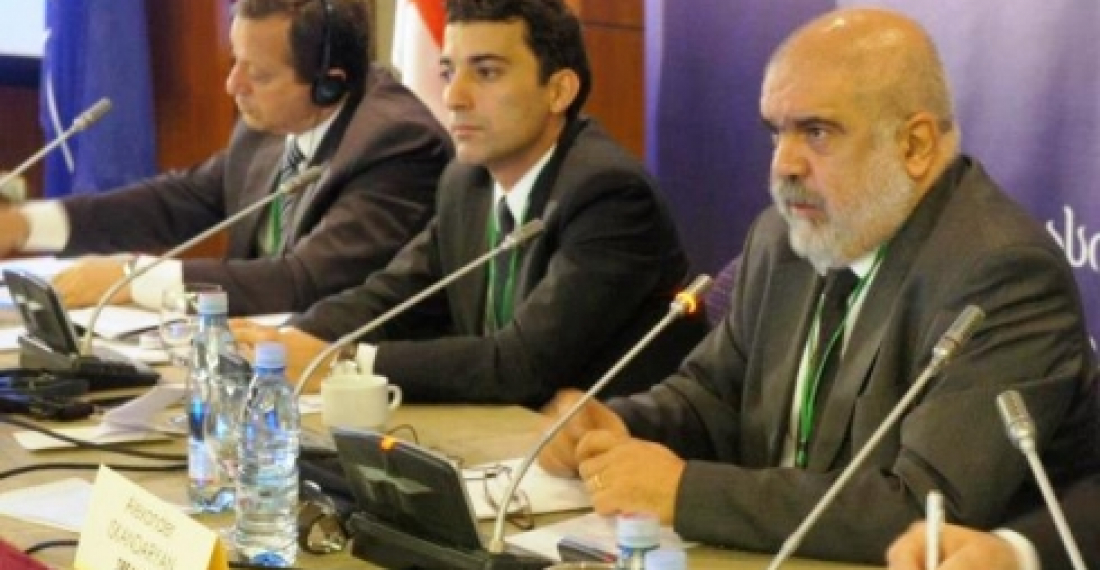The 83rd Rose-Roth seminar, held in the framework of the NATO Parliamentary Assembly, ended in Tbilisi on Wednesday. The last day of the event was dedicated mainly to the Karabakh conflict and wider regional issues. During the discussion Members of Parliament from different NATO states reiterated the importance of civil society organisations in helping resolve the Karabakh conflict and in the development of a peace and democracy in the region.
The day started with a panel discussion on the theme "Armenia, Azerbaijan and Turkey: Prospects of regional reconciliation." Introducing the debate, LINKS Director Dennis Sammut said that there was stagnation in the Karabakh peace process and the protocols signed between Armenia and Turkey in 2009 have failed to be taken to their natural conclusion. He said there was a need to learn from the lessons of the last twenty years and to consider what new initiatives were necessary to get the region out of its present stalemate.
Alexander Iskanderyan, of the Yerevan based Caucasus Institute said that there was no immediate prospect of positive change since the position of the sides was diametrically opposed. It was however not right to say that this was the fault of the Minsk Group since it was not in a position to solve the conflict instead of the parties. He said that the conflict was embeded in the mentality of the societies which in some cases was the mentality of the 19th century. A 21st century solution was not possible until this mentality changes.
Fariz Ismailizade, the Deputy Rector of the Diplomatic Academy in Azerbaijan said that the Turkish-Armenian protocol initiative failed because it was "half-cooked" and failed to take into account the linkage to the Nagorno-Karabakh conflict. He said that the international community had in recent years decreased its attention to the problems of the region and that the international mediators did not even have a strong enough political mandate from their home capitals. There was an urgent need for a road map that would give the sides hope for a solution because the risk of war remained, and there was a constant danger of provocations that could lead to incidents and a spill-over.
Mustafa Aydin, Rector of Kadir Has University in Istanbul said that he was pessimistic about the immediate future and all concerned needed to reconcil themselves with the fact that there were no short cuts to finding a solution. Turkey's interests in the region had changed and it now does not look at Azerbaijan simply from a pan-Turkic perspective but primarily sees it as an economic partner and part of its energy and economic strategy. Turkey wants to see stability in the region and Georgia's stability is of paramount importance in Turkish thinking. The Armenian-Turkish protocols were build on a degreee of contructive ambiguity which allowed the two sides to address some, but not all of the issues outstanding between them. However the protocols came at a time when there was not enough trust between the sides - either the leaderships or the populations at large, and interested sides, such as Azerbaijan and the Armenian diaspora were ignored completely. This meant that it was easy to take the momentum out of the process and it will now be some time before it can be regained.
There followed an interesting question and answer session during which several parliamentarians from NATO countries put questions to the panel. Former Italian Prime Minister Lamberto Dini made a passionate appeal to civil society in Armenia, Azerbaijan and Turkey to take the lead and not wait for the politicians. He said think tanks and NGOs needed to develop their own road map for the future and they must also help to heal the pains of the past. Dini appealed to put young people at the centre staghe of this process.
A second panel focused on the contribution of civil society to democracy and stabilty in the South Caucasus. The panel was chaired by French Parliamentarian Nathalie Goulet, and included Tengiz Pakhaladze from Georgia, Laura Baghdasarian from Armenia and Fuad Hassanov from Azerbaijan.
The event was closed with remarks by the Chairman of the NATO Parliamentary Assembly, British parliamentarian Hugh Bayley.
source: commonspace.eu
photo: from left to right: Professor Mustafa Aydin, Dr Fariz Ismailizade and Dr Alexander Iskanderyan speaking in a panel at the NATO Parliamentary ASssembly Rose-Roth Seminar in Tbilisi on 1 May 2013. (Picture courtesy of the NATO PA)







